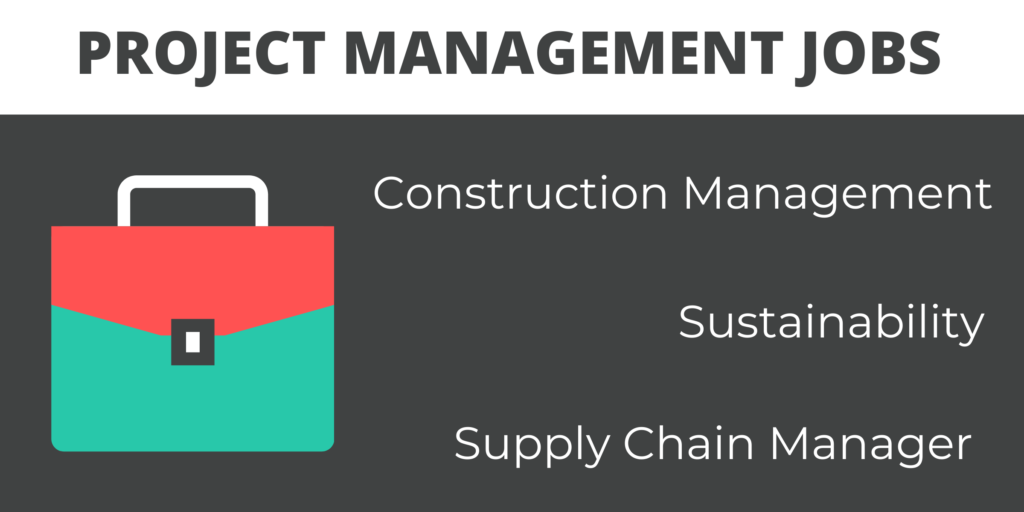
Let me tell you first hand, construction projects are HARD to stay on top of. There’s a reason why most contractors won’t give more than a general estimate for a given portion of a project. Things change. A wall gets taken down and you discover rot behind it. A storm messes with some of your supplies during the building process. You can’t rent a piece of needed heavy equipment on the day you need it and your project just lags.
All of that doesn’t even take into account managing the team of architects, general contractors, stakeholders, and licensing organizations required of large construction projects.
Despite all this, construction continues. It’s one of the largest employers in the United States, and the rewards are great for those willing to get the job done.
In this guide we’re going to look at ways you can pursue a formal education in construction management. While this isn’t always necessary to excel in the management of construction projects, it’s certainly a more efficient way to gain knowledge in many different fields you’ll need to understand about construction and management.
In particular, we’ll cover the following:
- What is construction management?
- What construction management degrees are available?
- What job opportunities are available for construction management degree holders?
- Future construction management job outlook
Not seeing what you’re looking for? Check out GreatBusinessSchools’ related content below:
- The 10 Best Real Estate Certificate Programs
- The 10 Most Affordable Real Estate Degrees
- The 50 Best Scholarships For Managers
- What Can I Do With a Degree in Project Management?
- What Can I Do With a Bachelor’s in Engineering Management?
- The 10 Most Affordable Engineering Management Bachelor’s
- The 10 Most Affordable Engineering Management Master’s
- The 10 Fastest Engineering Management Master’s
- The 15 Best Online Master’s in Engineering Management
What is construction management?

Construction management is a multidisciplinary pursuit that attempts to manage the scope, function, safety, quality, cost, and schedule of construction projects.
Typically construction managers are one of three main parties involved in a construction venture. The other parties include the owners or funders of the project, the architect(s) and engineer(s) who actually design the construction project, and the general contractor, who manages the day-to-day construction. It’s largely a construction managers job to coordinate between these three entities and ensure that the final project pushes forward according to the constraints listed in the first sentence of this section.
Construction management careers may be attained through a number of routes. Individuals may already be an architect or engineer who routinely works on construction projects. Others may work their way up through construction-related careers. While still others may approach construction management through being the investor or owner of a number of properties.
As such, each three of these ways of viewing the project, it’s successes and challenges, are important for construction managers to understand.
Not seeing what you’re looking for? Check out GreatBusinessSchools’ related content below:
- The 10 Best Real Estate Certificate Programs
- The 10 Most Affordable Real Estate Degrees
- The 50 Best Scholarships For Managers
- What Can I Do With a Degree in Project Management?
- What Can I Do With a Bachelor’s in Engineering Management?
- The 10 Most Affordable Engineering Management Bachelor’s
- The 10 Most Affordable Engineering Management Master’s
- The 10 Fastest Engineering Management Master’s
- The 15 Best Online Master’s in Engineering Management
What construction management degrees are available?

There are multiple degree types that can help you to break into construction management. The main types are available at the following levels.
- Construction/Building: Diploma, Associates
- Business/Management: Associates, Bachelor’s, Master’s, Doctorate
- Building Science: Bachelor’s
- Architecture: Master’s, Doctoral
- Engineering: Bachelor’s, Master’s, Doctoral
- Construction Management: Master’s
- Real Estate: Bachelor’s, Master’s
In particular, construction management degrees are most regularly offered as:
- Master’s in Business Administration – Construction or Real Estate Management Concentrations
- Master’s in Construction Management
- Master’s in Management – Construction Concentration
- Graduate Level Certificate in Construction Management
- Master’s in Real Estate
With the exception of a graduate certificate, these degree programs can typically be completed in 1-2 years. And many degree programs are built for professionals working full time.
The three most common delivery methods for master’s in construction management degree programs include:
- Part time, in person weekend or night courses
- Online flexible delivery courses
- In person daily (full time) courses
While courses vary depending on the specific program you’re pursuing, many of the most common courses within a construction management degree include:
Project Control Units or similar will introduce students to ways of thinking about and organizing complex projects to keep them under budget, away from scope creep, and supporting a quality construction. This type of course is also commonly found in project management degrees, though may be geared towards construction projects in particular when found in a construction management degree.
Construction Finance, Accounting, and Strategy introduces students to the terminology and frameworks they will need to deal with raising funds, managing budgets, and different financial instruments that are commonly applied to real estate portfolios. This type of course is critical for enabling construction managers to speak the language of project funders.
Construction Planning and Preconstruction is a must for new or aspiring construction managers. And many individuals involved with the construction of projects may be unaware that a successful construction project typically begins well before construction has actually started. Courses like this look at hiring, researching regulations, and looking at logistics prior to a construction project becoming underway.
Construction practices is typically the most foundational course within a construction management degree. This course often steps through many of the most routine construction projects while looking at best practices and sharing frameworks for communicating with all parties involved with the project effectively.
Management of teams is a course more commonly present in more management or business centered programs. This type of course lays the framework for effectively hiring, organizing, and tracking project-based work. For individuals who have worked their way up through the ranks of construction projects, introduction to formal project management methodologies could be very meaningful contributions to future career growth.
Not seeing what you’re looking for? Check out GreatBusinessSchools’ related content below:
- The 10 Best Real Estate Certificate Programs
- The 10 Most Affordable Real Estate Degrees
- The 50 Best Scholarships For Managers
- What Can I Do With a Degree in Project Management?
- What Can I Do With a Bachelor’s in Engineering Management?
- The 10 Most Affordable Engineering Management Bachelor’s
- The 10 Most Affordable Engineering Management Master’s
- The 10 Fastest Engineering Management Master’s
- The 15 Best Online Master’s in Engineering Management
What job opportunities are available for construction management degree holders?
The most obvious career opportunity coming from a construction management degree is that of construction manager. As we’ve gone over in this guide, construction managers are typically the lynchpin between investors or those who own a construction project, the general contractor (who oversees the actual day-to-day at a construction site), and the architects or engineers who design the project.
One of the most important skill sets for construction managers is that they can understand the terminology of all of the parties they are dealing with and effectively communicate these needs and initiatives to other teams. This can be a surprisingly difficult task as engineering, finance, and building professionals often have conflicting views of what needs to occur in a situation.

While construction managers can make a great deal more if they run their own business or also own the building they are constructing, the average wage for construction managers is presently $93,700.
A second role that a construction management, management, or real estate management degree can lead to is that of real estate developer. Real estate developers can function as essentially construction managers, but they typically are involved with other portions of the building process. In particular, real estate developers typically locate opportune locations to buy land and build completely new real estate projects. They typically take the most risk with a new real estate project, as they often are funding the project themselves (or taking on debt to do so).
Real estate developers tend to be involved with all stages of a real estate development beyond just the construction portion. These individuals may go on to manage properties for years and are typically those that locate opportunities to even begin construction.
It’s hard to pin down the salary of real estate developers, as many developments fail leading to large losses. On the flip side, many of the wealthiest individuals in the world are essentially real estate developers. With that said, the average wage for individuals who list their salary in this role is around $100,000 a year.
Third, individuals pursuing construction management or engineering management degrees can make careers out of working in architectural engineering. As one of the three areas of construction management, designing structures can go hand in hand with the planning of the actual implementation and funding. Many real estate developers have a decent knowledge of architecture and construction techniques. And many architects tend to pick up the business and construction sides of construction management. This can lead to very talented construction managers who understand building projects from the inside out.
The average salary for an architectural manager is presently $144,830.
Fourth, building and design managers within construction settings are in charge of effectively communicating what needs to happen plan and building wise to all of the teams involved in construction. In particular, design managers help to facilitate the creation of plans or designs for each component of a building project. This can be a very rewarding job that keeps projects on track and teams communicating smoothly. Knowledge of construction management principals can help these individuals to know what details may be most important to each type of team.
The average salary of building and design managers within construction settings is presently $85,000.
Fifth, in many larger construction projects there are many project managers involved. Project management can be a particularly valuable skill set as it is transferable to many different domains. This is particularly the case if you have some engineering knowledge and help to manage projects within construction from that perspective. Project managers work with small teams of often skilled technical individuals. Their primary job is to define the scope and stages that need to occur for a deliverable to be met.

Education in project management fields can be quite in-depth, with a wide variety of project management methodologies that individuals can begin to master over years of use.
The average salary for project managers within construction settings is presently $85,000.
Finally, program managers are present within the largest of building organizations. A program manager is typically tasked with overseeing a strategic initiative within an organization that encompasses several or many projects. For example, a real estate development company could task a program manager with overseeing the development of many subdivisions through a region of the country, with each subdivision being a set of separate properties.
Program managers typically operate at or right below the executive level. And one of their primary tasks within large organizations is to negotiate funding for all of their projects.
The average salary of a program manager in 2021 is presently $136,000.
Not seeing what you’re looking for? Check out GreatBusinessSchools’ related content below:
- The 10 Best Real Estate Certificate Programs
- The 10 Most Affordable Real Estate Degrees
- The 50 Best Scholarships For Managers
- What Can I Do With a Degree in Project Management?
- What Can I Do With a Bachelor’s in Engineering Management?
- The 10 Most Affordable Engineering Management Bachelor’s
- The 10 Most Affordable Engineering Management Master’s
- The 10 Fastest Engineering Management Master’s
- The 15 Best Online Master’s in Engineering Management
Future construction management job outlook
Construction has been one of the steadiest growth large industry segments in America for much of the last 70 years. With this said, there are notable exceptions such as the great recession and economically difficult times within the 70’s.
Due to the capital intensive nature of construction, large scale construction projects tend to occur when “business is booming.” This trickles down to individuals seeking to build houses or buildings for small businesses as well.
In recent years through good and bad economic times, development of high end or luxury properties has increased unabated. This bodes well for individuals seeking to enter construction management and stay in the field for lifelong opportunity.
Not seeing what you’re looking for? Check out GreatBusinessSchools’ related content below:
- The 10 Best Real Estate Certificate Programs
- The 10 Most Affordable Real Estate Degrees
- The 50 Best Scholarships For Managers
- What Can I Do With a Degree in Project Management?
- What Can I Do With a Bachelor’s in Engineering Management?
- The 10 Most Affordable Engineering Management Bachelor’s
- The 10 Most Affordable Engineering Management Master’s
- The 10 Fastest Engineering Management Master’s
- The 15 Best Online Master’s in Engineering Management
Carrie Morris
Author
Warren Dahl
Editor-in-Chief
